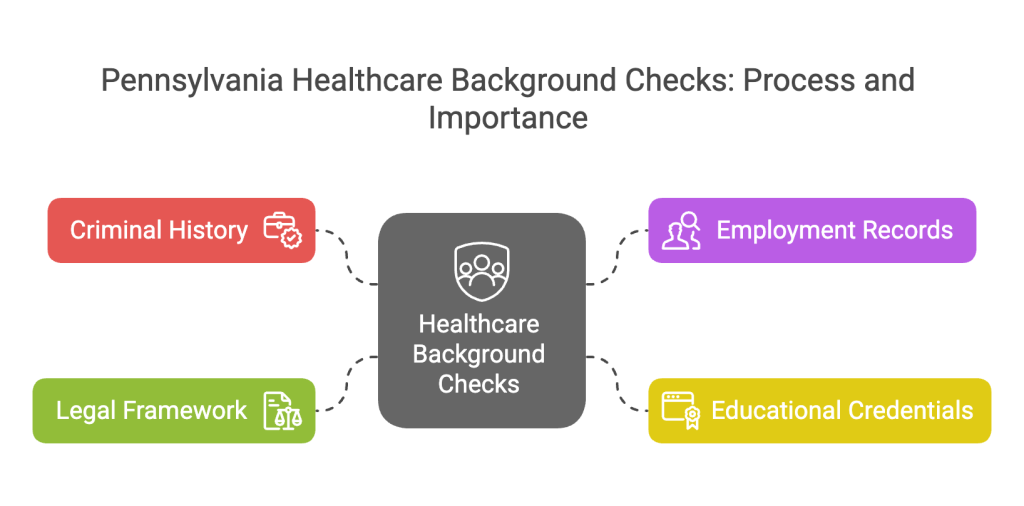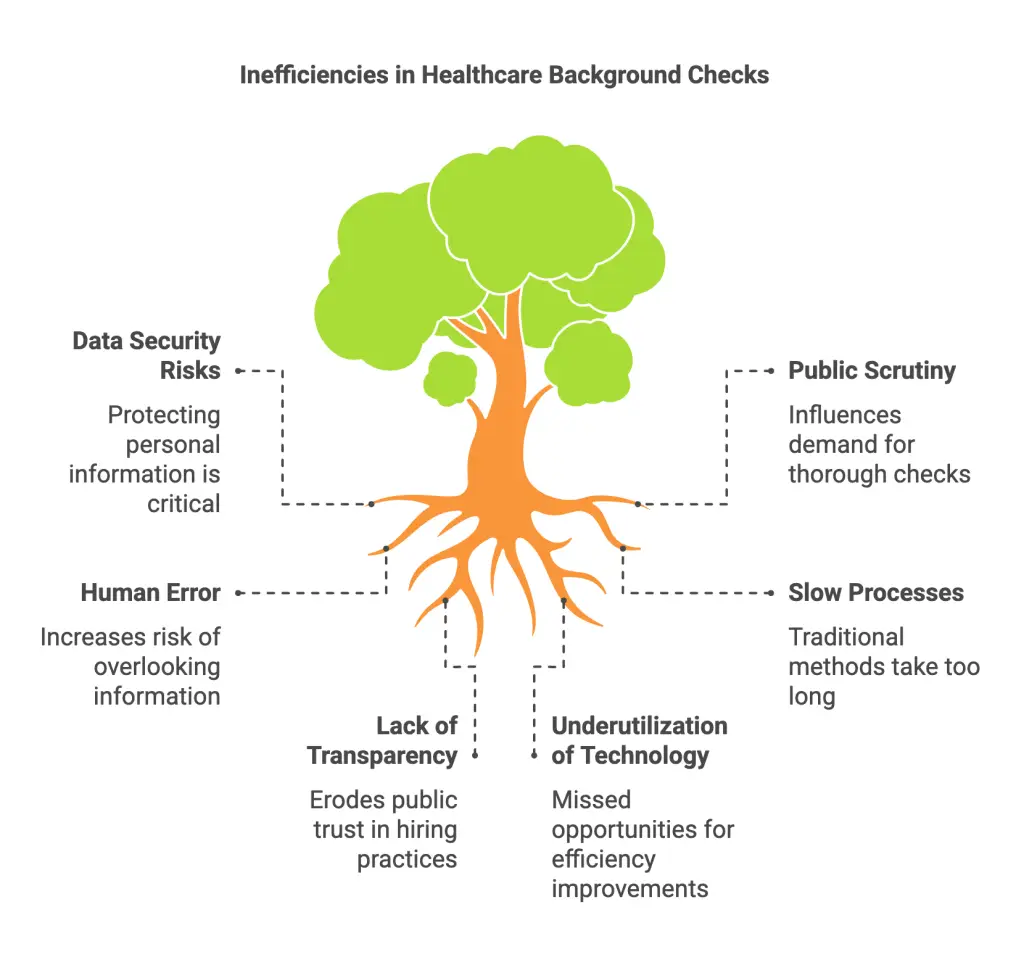The healthcare industry in Pennsylvania, like many other states, is subject to stringent regulations, particularly concerning background checks for licensing nurses and doctors. The safety and trust of patients are paramount, which is why Pennsylvania mandates comprehensive background checks for healthcare professionals. This article delves into the intricacies of Pennsylvania healthcare background checks, focusing on licensing processes for nurses and doctors. We will explore legal requirements, the impact of social and technological factors, data-driven insights, and conclude with actionable takeaways.
Key Takeaways
- Background checks for healthcare professionals in Pennsylvania are essential for patient safety and public trust.
- These checks include criminal history, employment, and educational verification to ensure high standards.
- Nursing and medical board disciplinary records significantly impact licensing decisions and highlight ethical commitments.
- Legal frameworks protect applicant rights, with avenues available for addressing discrepancies or disqualifications.
- Technological advances are making background checks faster and more efficient, enhancing reliability and accuracy.
Introduction
Background checks for healthcare professionals aren't just a box to tick. They're a critical step in protecting patients and upholding trust in the healthcare system. If you're operating or entering the medical field in Pennsylvania, understanding these checks is crucial.
In Pennsylvania, rigorous background checks are not an option; they're a requirement for licensing nurses and doctors. They ensure that those caring for vulnerable patients are qualified and trustworthy. This process includes verifying past employment, educational credentials, and checking for any criminal history or previous disciplinary actions. The aim is straightforward: safeguarding patient welfare.
This article sheds light on Pennsylvania's healthcare background checks. We'll break down the legal requirements, explore the implications of these checks, and provide a comprehensive guide to navigating them. Whether you're a seasoned practitioner or new to the field, understanding these processes is vital for your career and for delivering safe, ethical care.
Pennsylvania Healthcare Background Checks: An Overview
Healthcare background checks in Pennsylvania involve a detailed review of a candidate's history before they are allowed to work as a nurse or doctor. These checks ensure that individuals entering the medical field meet legal and ethical standards critical for patient safety and public trust.
The process typically includes verifying the applicant's criminal history, employment records, and educational credentials. For example, a potential nurse might go through a Pennsylvania State Police criminal history record check and an FBI fingerprint check. This comprehensive scrutiny guards against hires that could pose risks to patients or the integrity of healthcare institutions.

The legal framework for these checks is backed by both state and federal laws. State statutes require healthcare professionals to disclose any prior convictions, while federal laws like the Fair Credit Reporting Act (FCRA) regulate how background information is collected and used. Each candidate must consent to these checks, protecting their rights while ensuring thorough vetting.
Pennsylvania's system effectively filters applicants who may have committed crimes that could impact their ability to provide safe and ethical care. For instance, a felony related to patient abuse or fraudulent billing would likely disqualify an individual from obtaining a license.
These background checks are not just about catching past missteps. They serve as a preventative measure, ensuring that only those who uphold high moral and professional standards can enter the healthcare sector. Isn't it reassuring to know that such safeguards are in place to watch over you and your loved ones when you're at your most vulnerable?
PA Nursing License Checks
Background checks for nursing license applications in Pennsylvania have a structured approach. If you're a nursing applicant, expect your background check to cover three key areas: criminal history, employment verification, and educational credentials.
The criminal history check is thorough. It pulls data from state databases and national criminal repositories. This is to ensure that no past convictions pose a risk to patient safety. Even minor infractions can come under scrutiny, so full disclosure is necessary.
Employment verification is another critical component. The Pennsylvania State Board of Nursing verifies past work experiences. If you claimed experience in healthcare settings, be ready to provide references who can affirm your responsibilities and conduct.
Education credentials are equally important. Your alma mater's records will be checked for authenticity, ensuring your nursing education meets Pennsylvania standards. If you're from a foreign country, you might need additional evaluations.
The Pennsylvania State Board of Nursing sets forth these requirements. They don't just rely on data; they set the rules to ensure that every nurse practicing in the state meets a high standard of ethical and professional conduct.
Recent statistics show an increased volume of nursing applications and, consequently, a rise in background check processing. Trends indicate a small percentage of applicants face delays due to discrepancies in their backgrounds. This highlights the importance of accuracy and honesty in your application.
Does the thought of a background check make you uneasy? It's a crucial part of maintaining the integrity of healthcare services. With the right preparation, you can approach this process with confidence.
Medical Board Disciplinary Records
Medical board disciplinary records play a vital role in background checks for doctors. These records contain information about past disciplinary actions, such as suspension, probation, or revocation of a medical license. Each action recorded is significant, influencing whether a doctor can practice. For licensing boards, these records act as a safeguard to ensure that applicants meet professional standards.
Disciplinary actions cover a range of offenses, including unethical conduct, malpractice, and substance abuse issues. Having such a record doesnât always mean an automatic rejection, but it does raise red flags that require careful evaluation. The Pennsylvania State Board of Medicine is responsible for managing these records. They ensure that all actions taken against doctors are documented and transparent, enabling licensing boards to make informed decisions.
Data over recent years indicates various types of disciplinary actions. Common issues include violation of professional ethics and failure to maintain proper medical standards. For instance, in the last five years, Pennsylvania has seen an increase in disciplinary actions tied to opioid prescriptions. This trend highlights the growing focus on safe prescribing practices.
If youâre involved in the licensing process, understanding how disciplinary records impact decisions is crucial. Considering the types and frequency of actions listed, one must assess the context and severity before denying or granting a license. These records underscore the importance of accountability in maintaining trust within the medical profession.
Social and Technological Impact on Healthcare Background Checks
Technology is reshaping how background checks are conducted in the healthcare industry. Automation and digital records are central to these changes. Today, conducting background checks can be quicker and more accurate, reducing the workload for hiring departments. Electronic health records, digital criminal databases, and online credential verification systems mean less time spent on paperwork and more consistent outcomes.

These technological advancements also help minimize human error. Automated systems can cross-check vast amounts of data efficiently, reducing the risk of overlooking critical information. For example, criminal background checks that once took weeks can now be completed in days, if not hours. However, it's crucial to ensure data security to protect personal information from breaches.
Social factors also play a considerable role in shaping healthcare background checks. Public scrutiny and media coverage can influence how these checks are perceived and implemented. A highly publicized misstep in hiring can lead to increased demand for transparent and thorough background processes. Public trust is essential, and healthcare institutions must balance privacy with the need for transparent operations.
Innovations in technology have allowed for new possibilities in background checks. Developments in artificial intelligence and machine learning could further enhance process efficiency, potentially identifying red flags in patterns unseen by manual checks. This could mean the difference between a successful hire and a costly mistake. How might your organization leverage these technologies to ensure more reliable background checks? What measures can you take to improve public confidence in your hiring practices?
Actionable Takeaways
Getting ready for a background check can be straightforward if you know what to do. First, gather all necessary documents like your criminal history, employment records, and educational certificates. Ensure everything is up-to-date and accurate. If there's anything that might raise concerns, be prepared to discuss it openly.
For healthcare employers, it's crucial to have a solid system for conducting background checks. Develop a checklist to ensure completeness and compliance with state and federal regulations. Training your HR team on handling sensitive information correctly is also vital to avoid legal issues.
Regulatory bodies can play a key role by fostering transparency. Providing clear guidelines and timelines for the background check process can reduce stress for applicants. Additionally, investing in technology that speeds up data processing without sacrificing accuracy can improve overall efficiency.
By focusing on these practical steps, applicants, employers, and regulators can ensure a smoother and more reliable background check experience in Pennsylvania's healthcare industry.
Conclusion
Maintaining public trust in Pennsylvania's healthcare system hinges on thorough background checks. These checks are essential to ensure that licensed nurses and doctors meet the highest standards of integrity and professionalism. They serve as a safeguard against potential risks to patient safety and ensure that only qualified individuals serve within the healthcare field.
The constant dialogue among healthcare stakeholders is vital. Regulatory bodies, medical professionals, and employers should continually collaborate to refine and update the background check processes. This ongoing communication ensures that the procedures remain both fair and effective, adapting to new challenges, legal changes, and technological advancements.
Looking ahead, the future of healthcare background checks in Pennsylvania is likely to be shaped by continued technological advancements. These innovations could offer more accurate and efficient checks, reducing the time and resources needed. As the landscape evolves, fostering a culture of transparency and accountability will remain crucial. Such a culture will encourage trust not only within the medical community but also among patients who rely on healthcare professionals for safe and effective care.
Frequently Asked Questions (FAQs)
What crimes disqualify healthcare workers in PA?
You will be disqualified for crimes such as homicide, drug trafficking, and sexual offenses, among others. These are considered serious enough to prevent safe practice in healthcare.
How long does a PA nursing license background check take?
Typically, it takes 4 to 6 weeks for the background check to be completed. Timelines may vary based on the case's complexity.
Can a DUI affect a medical license in Pennsylvania?
Yes, a DUI can impact your license. It may lead to disciplinary actions or even suspension, depending on the severity and repeat offenses.
Does PA check the National Practitioner Data Bank?
Yes, Pennsylvania checks this database to verify your professional history and any disciplinary actions or malpractice claims.
Are expunged records visible to PA medical boards?
Expunged records are generally not visible to the medical boards. However, itâs best to consult a legal advisor to understand your specific situation.
How to appeal a healthcare license denial in PA?
You can appeal by requesting a hearing with the board. Prepare documentation supporting your case to improve your chances.
Do PA hospitals require fingerprinting?
Yes, fingerprinting is part of the background check process for employment in many hospitals in Pennsylvania.
Can out-of-state convictions affect PA healthcare jobs?
Yes, out-of-state convictions can influence your job prospects in Pennsylvania, especially if they relate to serious offenses.
How often must PA nurses renew background checks?
Nurses typically renew background checks every two years as part of license renewal requirements.
Are PA telemedicine providers subject to extra checks?
Telemedicine providers must meet the same standards as in-person practitioners. Additional checks depend on practice-specific requirements.
What is the process for obtaining a Pennsylvania medical license?
You must submit an application, complete a background check, and provide proof of education and certifications. Additional steps include passing any required exams.
Do healthcare workers need to report arrests to the board?
Yes, under the mandatory reporting regulations, you must report any arrests to the relevant licensing board immediately.
How can you rehabilitate your healthcare license after revocation?
You will need to demonstrate rehabilitation through continued education, legal compliance, and possibly a probationary period.
Are there any specific continuing education requirements for PA healthcare workers?
Yes, you must complete a set number of continuing education hours to maintain your license, specific to your field and specialty.
Definitions
Criminal History Check
A criminal history check searches state and federal databases to find any past convictions or charges against an individual. For healthcare jobs, these checks help employers assess whether someone's past behavior might put patients at risk. In Pennsylvania, they often include checks from the Pennsylvania State Police and FBI fingerprint screenings. Even minor offenses can be questioned, so accuracy and honesty are important.
Employment Verification
Employment verification confirms your past job roles, dates of employment, and overall conduct. It's a way to make sure the work experience you claim is real and aligns with industry expectations. The Pennsylvania State Board of Nursing uses this to validate skills and behavior in prior healthcare settings. You'll likely need to provide references who can support your work history.
Educational Credentials
This refers to the verification of your academic background, including degrees or certifications from nursing or medical schools. Licensing boards check this information to ensure healthcare professionals have completed approved programs. If you're educated outside the U.S., you may need additional evaluation. Mismatches or fake credentials can delay or block your license.
Disciplinary Records
Disciplinary records show any past actions taken against you by a licensing board, like suspension or license revocation. These records reflect whether you've violated professional rules, such as ethical standards or care practices. In Pennsylvania, the State Board of Medicine reviews these records before approving or denying licenses. One violation wonât always disqualify you, but it will require careful review and explanation.
Fair Credit Reporting Act (FCRA)
The FCRA is a federal law that controls how background information is collected and used by employers. It gives you the right to know what's found in your background check, consent to the check, and dispute errors. If incorrect information appears on your record, you can appeal and ask for a correction. This protects your personal data while allowing employers to make informed hiring decisions.

GCheck Editorial Team
Meet the GCheck Editorial Team, your trusted source for insightful and up-to-date information in the world of employment background checks. Committed to delivering the latest trends, best practices, and industry insights, our team is dedicated to keeping you informed.
With a passion for ensuring accuracy, compliance, and efficiency in background screening, we are your go-to experts in the field. Stay tuned for our comprehensive articles, guides, and analysis, designed to empower businesses and individuals with the knowledge they need to make informed decisions.
At GCheck, we're here to guide you through the complexities of background checks, every step of the way.





